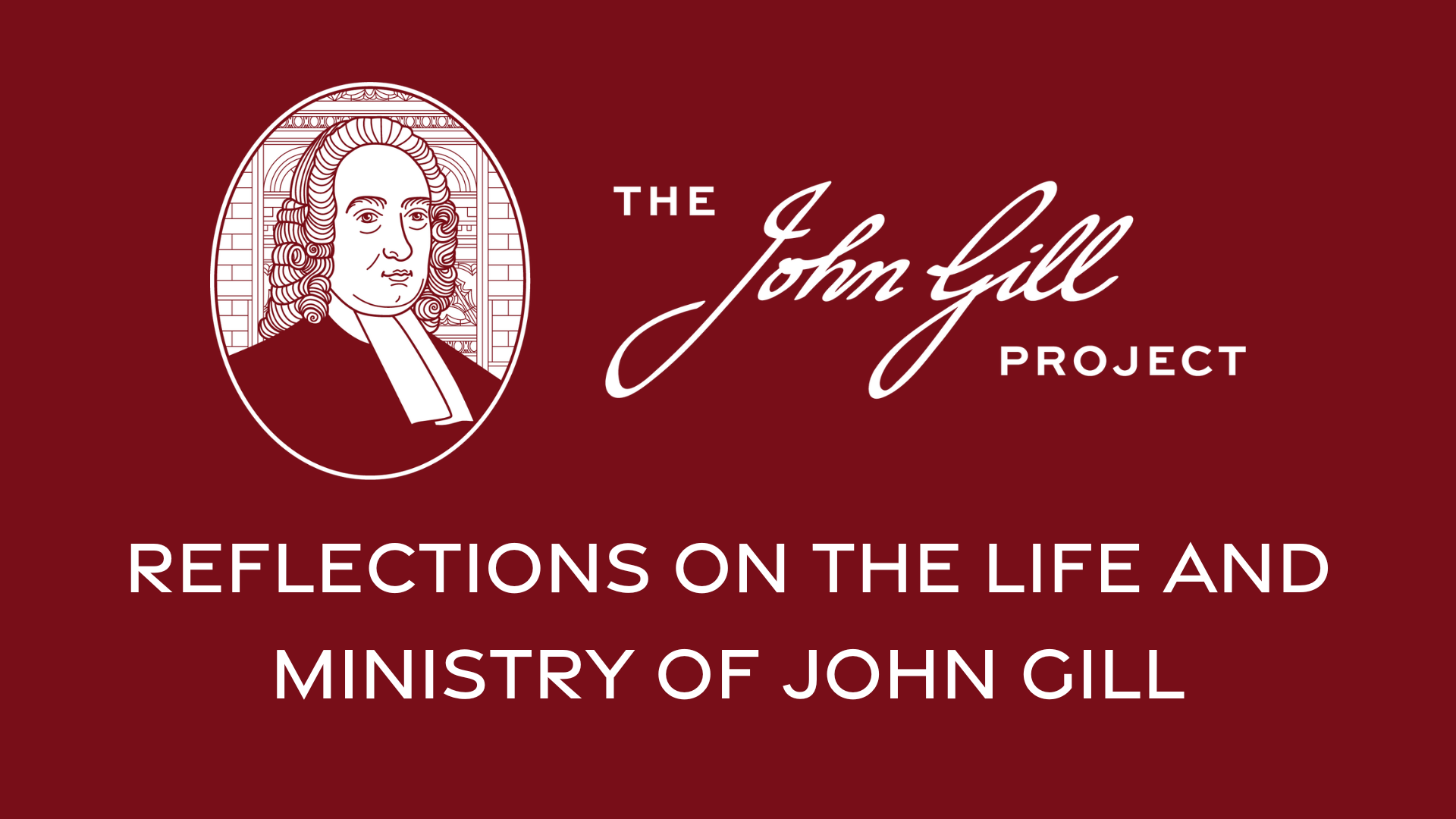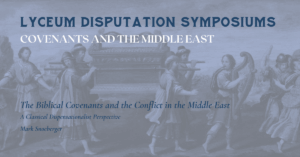I was introduced to John Gill (1697–1771) in 2015. Since then, I’ve dedicated my studies to retrieving his life and ministry. From my formative MDiv days to now writing my dissertation on him, I’ve read most of his works and as much of the secondary literature on his life and thought that I have been able to get my hands on. That said, I want to offer a smattering of observations about his life and ministry that will hopefully encourage individuals unfamiliar with Gill to consider studying his life and works.
Gill was an English Baptist minister in London during the long eighteenth century. He is remembered for a variety of reasons such as his massive writing ministry and lengthy pastorate. All told, his body of work consists of over 10,000 pages of sermons, tracts, commentaries, and theological treatises.
Gill pastored the same congregation for 51 years. An impressive feat, but Gill holds only the third longest pastorate at the church: Peter Masters (the congregation’s current pastor) has been at the church for 52 years and John Rippon (Gill’s immediate successor) pastored the church for 63 years. Perhaps the most famous of Gill’s successors, Charles Spurgeon, pastored the church for 38 years, and Benjamin Keach, Gill’s most prominent predecessor, pastored the church for 36 years.
Regarding his works, many of which began as sermons and lectures, Gill’s Body of Doctrinal and Practical Divinity was one of (if not the) first systematic theology in the Baptist tradition. Depending on how you define a systematic theology, Thomas Grantham’s Christianism’s Primitivus (published in 1678) might be first. But this isn’t Gill’s most important work, in my estimation. Gill also wrote the first commentary on the entire Bible, probably ever. He completed this before he wrote his systematic, meaning he set to the task of knowing the Scriptures to the best of his ability (in their entirety and in the original languages!) before compiling his systematic.
Speaking of languages, Gill was an autodidact. He learned Greek, Latin, and Hebrew before his teen years. He also dabbled in Aramaic and other Semitic languages. Gill not only knew these languages, he utilized them proficiently in his writing. At times he engaged with the patristics in Greek, some Reformers, Reformed Orthodox, and others in Latin, and Rabbinical literature in Hebrew.
Gill’s first major work was on the Song of Solomon, and Spurgeon viewed it as Gill’s best work, saying “It was the best thing Gill ever did. He could not exhaust his theme, but he went as far as he could so doing… Those who despise it have never read it, or are incapable of elevated spiritual feelings.”[1] Like many of Gill’s works, his Song of Solomon commentary was not without controversy. The commentary was partially occasioned by a notable scholar who denied the canonicity of the Song. Later in Gill’s life, said scholar intended to go hear Gill preach because he had heard of his erudition, but upon learning of Gill’s writing of a commentary on the Song of Songs, the man refused to hear Gill speak.
While Gill’s Body of Divinity might be his most referenced work by scholars, and his commentary most engaged with in sermon preparation by pastors, his Cause of God and Truth might be his most read. Gill’s Cause of God and Truth is a defense of Calvinism against Daniel Whitby’s Arminian proposal. In one section of the work, Gill addresses “problem texts” for the Calvinistic position. Of this book, Martyn Lloyd-Jones said, “It is, in my opinion, of any reading, the most thorough treatment of these texts which are difficult for Calvinists, or at least which causes them difficulties if they are honest.”[2]
When I get asked about why I think Gill is important, I often struggle to give a succinct answer. His writing output was massive, his learning unmatched among the Baptists, and he faithfully pastored the same congregation as Keach, Rippon, and Spurgeon. But at the end of the day his role in preserving orthodoxy among the Particular Baptists during a century of actual Trinitarian downgrade (folks were becoming committed Unitarians) is his most significant achievement in my estimation. Because of these things and others, Gill was probably the most influential figure among the Particular Baptists in London during the eighteenth century. He even chaired the Particular Baptist Fund, which helped finance pastors and their education, and was a fund he himself benefited from in his early years of ministry.
Gill was not only influential among Baptists on the British Isles but was also very influential in America. Gill recommended Morgan Edwards for the pastorate of the first Baptist church in Philadelphia. Edwards would go on to partner with James Manning in the founding of Rhode Island Baptist College, now known as Brown University. Gill donated a collection of his works and a collection of the works of the early church fathers to the school and gave to the institution financially as well.
So influential was Gill in America, that when a controversy arose over infant baptism, American Baptists reached out to Gill asking him to address the controversy, which he did in a tract published in Boston. Gill also influenced Jesse Mercer and the Georgia Baptists, the Carolinian Baptists through the first few years Elhanan Winchester’s ministry in Welsh Neck, and even John Leland. As a side note, someone should really do a dissertation on Gill’s impact on eighteenth-century Baptists in America. It would be a fascinating study.
Other than these ministry accolades, Gill was a devout husband. At one point in his marriage to Elizabeth, she grew ill. He was so attentive to his ailing wife that some in the church accused Gill of forsaking his pastoral duties. He was also a good father to his children, though only three survived infancy. Gill led his family in morning and evening worship. Though he often ate chocolate for breakfast in his study, he rarely missed joining his family for dinner in the evenings.
There are a variety of anecdotes about Gill’s life that are often recounted, such as the fallen chimney stacks. The story is this: Gill was so studious in his pastoral and theological endeavors that it became commonplace to confirm the surety of things in comparison to Gill’s habit of being in his study. The phrase “it is as sure as Dr. Gill is in his study” illustrates the frequency with which he resided in that place. Yet, on March 15, 1752, there was a major storm in London that caused the chimney to fall through the roof of the Gill residence and into his study, destroying the area where he worked. Gill was not in his study at the time or he would have been killed. Ironically, a friend of Gill’s had praised the usefulness of a man’s study for “keeping him out of harm’s way” prior to the incident. Remembering this remark after chimney fell, Gill went to that friend and responded, “What are to come of [those] words now, since a man may come to danger and harm in his closet, as well as on the highway, if not protected by the special care of God’s providence?”
Other anecdotes include stories of Gill responding to harsh church members, such as telling one individual to “go up and do better!” after being accosted about the quality of his sermon. One particularly interesting event that took place during Gill’s life was a breakfast he attended alongside George Whitfield, John Wesley, and other evangelical leaders. Gill even addressed the group with a short exhortation – an interesting scene given Gill’s reputation in the nineteenth and twentieth centuries as a critic of the revivals. Said breakfast notwithstanding, Gill and Wesley had their disputes, particularly on the doctrine of predestination, a dispute that even produced some slam poetry. But, despite their differences, there was respect between them. Wesley referred to Gill as “a positive man who fights for his opinions through thick and thin.”
While there are many positive stories from Gill’s life, there are difficult ones too. On several occasions, Gill led his church to excommunicate members for not holding to the church’s doctrinal statement. One example comes from a member who was excommunicated for rejecting the eternal generation of the Son. While this may seem harsh, Gill was slow to exercise church discipline. Of his long-suffering for his church members, Rippon wrote that Gill “really ‘bore with their weaknesses, failings, and infirmities,’ and particularly when he saw they were sincerely on the Lord’s side.”
Gill also had the sorrowful responsibility of preaching the funerals of his thirteen-year-old daughter Elizabeth and of his wife of forty-six years. The sermon at his daughter’s funeral however had to be cut short because of his emotion. Gill said: “My affections will not permit me to give you an account of the ground and reason of this hope, this faith, this confidence; perhaps I may communicate it to you in another way. I find it I must break off at once. Consider what has been said, and the Lord give us understanding.”
There is much more to be said about Gill’s life, such as his pre-London years; his ministry, such as his Great Eastcheap lectureship; his works and all the surrounding controversies, such as the “Hyper-Calvinism” debate; but allow me to conclude with three of my favorite quotes:
“Prayer is the breath of a regenerate man.”
“I value nothing in comparison to gospel truths. I am not afraid to be poor.”
“I am a Baptist, he may call me, if he pleases, a new Baptist, or an old Calvinistical one, or an Antinomian; it is a very trifle to me, by what name I go.”
*This short article originally appeared as a thread on Twitter. The thread can be viewed here.*
[1] Quoted in Graham Harrison, Dr. John Gill and His Teaching: Being the Annual Lecture by the Evangelical Library,(London: Evangelical Library, 1971), 31. Lloyd-Jones made final remarks after Harrison’s address to the Evangelical Library, and his remarks were included at the conclusion of the published address.
[2] Charles Spurgeon, Commenting & Commentaries: Two Lectures Addressed to the Students of the Pastors’ College, Metropolitan Tabernacle, (London: Passmore & Alabaster, 1876), 113.
Author
-

Colton Strother is a PhD candidate in Historical Theology at Midwestern Seminary where he is studying John Gill. He received his Th.M. & M.Div. degrees from Midwestern and a B.S. in Religious Studies from Missouri State University. Currently, he serves at Midwestern as an Instructional Designer and Adjunct Instructor. In his free time he enjoys golfing, reading fiction (as well as theology & history), making hot sauce, watching St. Louis sports, and spending time hiking and hammocking with his wife Leea, to whom he has been joyfully married since 2018.
View all postsRecent Posts





